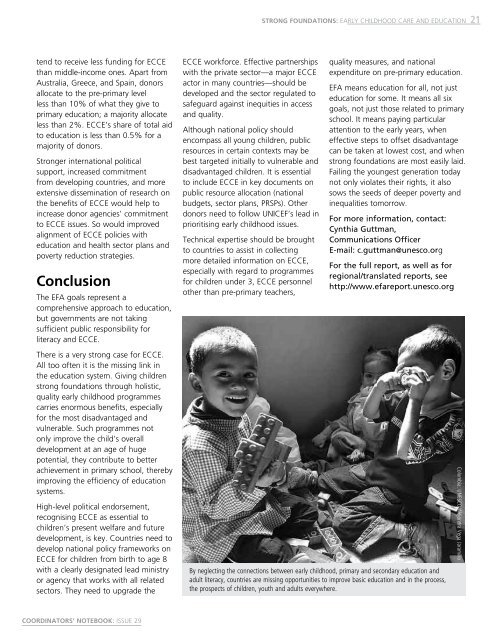A global call to action for early childhood
A global call to action for early childhood
A global call to action for early childhood
You also want an ePaper? Increase the reach of your titles
YUMPU automatically turns print PDFs into web optimized ePapers that Google loves.
Strong foundations: Early <strong>childhood</strong> care and education<br />
21<br />
tend <strong>to</strong> receive less funding <strong>for</strong> ECCE<br />
than middle-income ones. Apart from<br />
Australia, Greece, and Spain, donors<br />
allocate <strong>to</strong> the pre-primary level<br />
less than 10% of what they give <strong>to</strong><br />
primary education; a majority allocate<br />
less than 2%. ECCE’s share of <strong>to</strong>tal aid<br />
<strong>to</strong> education is less than 0.5% <strong>for</strong> a<br />
majority of donors.<br />
Stronger international political<br />
support, increased commitment<br />
from developing countries, and more<br />
extensive dissemination of research on<br />
the benefits of ECCE would help <strong>to</strong><br />
increase donor agencies’ commitment<br />
<strong>to</strong> ECCE issues. So would improved<br />
alignment of ECCE policies with<br />
education and health sec<strong>to</strong>r plans and<br />
poverty reduction strategies.<br />
Conclusion<br />
The EFA goals represent a<br />
comprehensive approach <strong>to</strong> education,<br />
but governments are not taking<br />
sufficient public responsibility <strong>for</strong><br />
literacy and ECCE.<br />
There is a very strong case <strong>for</strong> ECCE.<br />
All <strong>to</strong>o often it is the missing link in<br />
the education system. Giving children<br />
strong foundations through holistic,<br />
quality <strong>early</strong> <strong>childhood</strong> programmes<br />
carries enormous benefits, especially<br />
<strong>for</strong> the most disadvantaged and<br />
vulnerable. Such programmes not<br />
only improve the child’s overall<br />
development at an age of huge<br />
potential, they contribute <strong>to</strong> better<br />
achievement in primary school, thereby<br />
improving the efficiency of education<br />
systems.<br />
High-level political endorsement,<br />
recognising ECCE as essential <strong>to</strong><br />
children’s present welfare and future<br />
development, is key. Countries need <strong>to</strong><br />
develop national policy frameworks on<br />
ECCE <strong>for</strong> children from birth <strong>to</strong> age 8<br />
with a cl<strong>early</strong> designated lead ministry<br />
or agency that works with all related<br />
sec<strong>to</strong>rs. They need <strong>to</strong> upgrade the<br />
ECCE work<strong>for</strong>ce. Effective partnerships<br />
with the private sec<strong>to</strong>r—a major ECCE<br />
ac<strong>to</strong>r in many countries—should be<br />
developed and the sec<strong>to</strong>r regulated <strong>to</strong><br />
safeguard against inequities in access<br />
and quality.<br />
Although national policy should<br />
encompass all young children, public<br />
resources in certain contexts may be<br />
best targeted initially <strong>to</strong> vulnerable and<br />
disadvantaged children. It is essential<br />
<strong>to</strong> include ECCE in key documents on<br />
public resource allocation (national<br />
budgets, sec<strong>to</strong>r plans, PRSPs). Other<br />
donors need <strong>to</strong> follow UNICEF’s lead in<br />
prioritising <strong>early</strong> <strong>childhood</strong> issues.<br />
Technical expertise should be brought<br />
<strong>to</strong> countries <strong>to</strong> assist in collecting<br />
more detailed in<strong>for</strong>mation on ECCE,<br />
especially with regard <strong>to</strong> programmes<br />
<strong>for</strong> children under 3, ECCE personnel<br />
other than pre-primary teachers,<br />
quality measures, and national<br />
expenditure on pre-primary education.<br />
EFA means education <strong>for</strong> all, not just<br />
education <strong>for</strong> some. It means all six<br />
goals, not just those related <strong>to</strong> primary<br />
school. It means paying particular<br />
attention <strong>to</strong> the <strong>early</strong> years, when<br />
effective steps <strong>to</strong> offset disadvantage<br />
can be taken at lowest cost, and when<br />
strong foundations are most easily laid.<br />
Failing the youngest generation <strong>to</strong>day<br />
not only violates their rights, it also<br />
sows the seeds of deeper poverty and<br />
inequalities <strong>to</strong>morrow.<br />
For more in<strong>for</strong>mation, contact:<br />
Cynthia Guttman,<br />
Communications Officer<br />
E-mail: c.guttman@unesco.org<br />
For the full report, as well as <strong>for</strong><br />
regional/translated reports, see<br />
http://www.efareport.unesco.org<br />
By neglecting the connections between <strong>early</strong> <strong>childhood</strong>, primary and secondary education and<br />
adult literacy, countries are missing opportunities <strong>to</strong> improve basic education and in the process,<br />
the prospects of children, youth and adults everywhere.<br />
Colombia: UNESCO/Alejandra Vega Jaramillo<br />
COORDINATORS’ NOTEBOOK: ISSUE 29
















